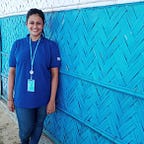Night in the Rohingya camps — WFP Storyteller reminisces his life, now and then
A steaming cup of tea. The cheers from the neighbourhood kids. A laugh at the dinner table. Small moments like these make up our days and show who we really are.
This World Refugee Day, the Rohingya refugees share their stories and take us inside the moments that make up a day in their lives, set against the world’s largest refugee camp.
Jeyabol Hoque
Jeyabol Hoque, a WFP Storyteller, wrote this piece to gives us a glimpse of his of in the camps.
It has been four years that I’ve been calling Kutupalong refugee camp my home. When I recall my time here in the camps, fond memories of playing different games with my friends are the ones that bring a smile to my face. Nights are the times we call our own. After the bustling days, we sit down together as families to have dinner in our shelters. On more joyous occasions, we arrange mini picnics and share meals and joy.
Nights, however, take me back to memories of loss. I was 19 years old when my father gave me a bicycle as a present. I used to ride the bicycle to and from my school. I lost my father to a disease shortly after. After that, I stopped going to school and started working at a job my brother arranged for me. My brother later sold my bicycle. As I left school, I fell out of touch with my friends as well. I don’t dwell too much on these things, but there are also times one remembers the life one had.
Nights hold some of the best memories of my life and some of the scariest. In my class, there was a girl who I loved, and she loved me back. When I stopped attending school, we could not meet because I worked until late every night. But like a fairy tale, we got a happy ending. We married when I turned 21, and I remember dancing on my wedding night with joy. One year later, my wife was pregnant.
When my daughter was just three months old, our family visited my wife’s hometown. One night, we heard screams and shouts. The next thing we knew, we were also running together with them, leaving all our belonging and homes behind. We kept on running. The journey was arduous; we spent seven days walking through a forest to cross the border from Myanmar into Bangladesh. Life as we knew it changed, all within a span of that fateful night in my wife’s hometown.
We ended up here in this camp, where I built a shelter for my family. The local Bangladeshi families gave us food and water. Eventually, the World Food Programme came in to support the Rohingya refugees, and since then, they been providing us with food on a regular basis. I enrolled myself in WFP’s Storytellers programme where I learnt how to use words and images to express my sorrow and joy.
The nights here are calmer than the days. Most people in the camps enjoy dinners, meals, and picnics together. After meals, it is story time. All of us have shared history, and all of our stories — despite similarities — are also distinct from one another. By telling stories, we get through the hardships and keep our hopes alive.
I still dream about the bicycle my father gave me in Myanmar. Every time I thought about it, sadness ascended upon me. My motherland is also distant to me now. My life is now in this camp, far from perfect but at least I have my family, relatives, and friends. For now, this is enough, and I am happy.
